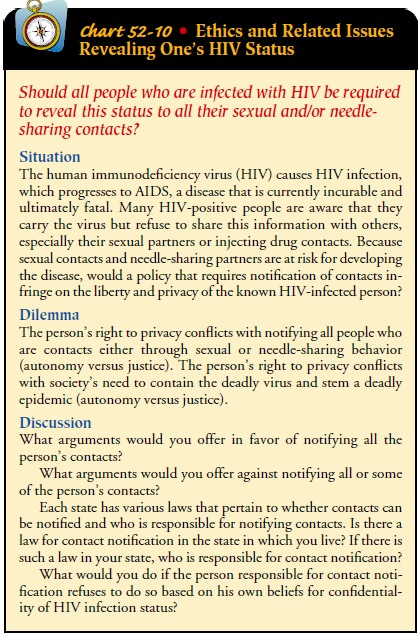Chapter: Medical Surgical Nursing: Management of Patients With HIV Infection and AIDS
Emotional and Ethical Concerns - Patients With HIV Infection and AIDS
Emotional and Ethical Concerns
Nurses in all settings will be called on to
provide care for patients with HIV infection. In doing so, they encounter not
only the physical challenges of this epidemic but also emotional and ethical
concerns. The concerns raised by health care professionals in-volve issues such
as fear of infection, responsibility for giving care, values clarification,
confidentiality, developmental stages of pa-tients and caregivers, and poor
prognostic outcomes.
Many
patients with HIV infection have engaged in “stigma-tized” behaviors. Because
these behaviors challenge some tradi-tional religious and moral values, nurses
may feel reluctant to care for these patients. In addition, health care
providers may still have fear and anxiety about disease transmission despite
education concerning infection control and the low incidence of transmis-sion
to health care providers (Chart 52-10). Nurses are encour-aged to examine their
personal beliefs and use the process of values clarification to approach
controversial issues. The Ameri-can Nurses Association’s Code for Nurses can
also be used to help resolve ethical dilemmas that might affect the quality of
care given to HIV-infected patients.

Nurses are responsible for protecting the
patient’s right to privacy by safeguarding confidential information. Inadvertent
disclosure of confidential patient information may result in per-sonal,
financial, and emotional hardships for HIV-infected indi-viduals. The
controversy surrounding confidentiality concerns the circumstances in which
information can be disclosed to others. Health care team members need accurate
patient information to conduct assessment, planning, implementation, and
evaluation of patient care. Failure to disclose HIV status could compromise the
quality of patient care. Sexual partners of HIV-infected patients should know
about the potential for infection and the need to engage in safer sex
practices, as well as the possible need for test-ing and medical care. Nurses
are advised to discuss concerns about confidentiality with nurse administrators
and professional nursing organizations such as the Association of Nurses in
AIDS Care, and to consult legal experts in their state to identify the most
appropriate course of action.
AIDS has had a high mortality rate, but advances in anti-retroviral and multidrug therapy have demonstrated promise in slowing or controlling disease progression. It is not known whether current treatment regimens will remain effective, because viral drug resistance has developed with most previous medications.
Related Topics